Unit 4 - Unit 6 复习课件(共30张PPT)2023-2024学年人教版英语七年级上册
文档属性
| 名称 | Unit 4 - Unit 6 复习课件(共30张PPT)2023-2024学年人教版英语七年级上册 |  | |
| 格式 | pptx | ||
| 文件大小 | 14.4MB | ||
| 资源类型 | 教案 | ||
| 版本资源 | 人教新目标(Go for it)版 | ||
| 科目 | 英语 | ||
| 更新时间 | 2023-12-11 21:08:03 | ||
图片预览

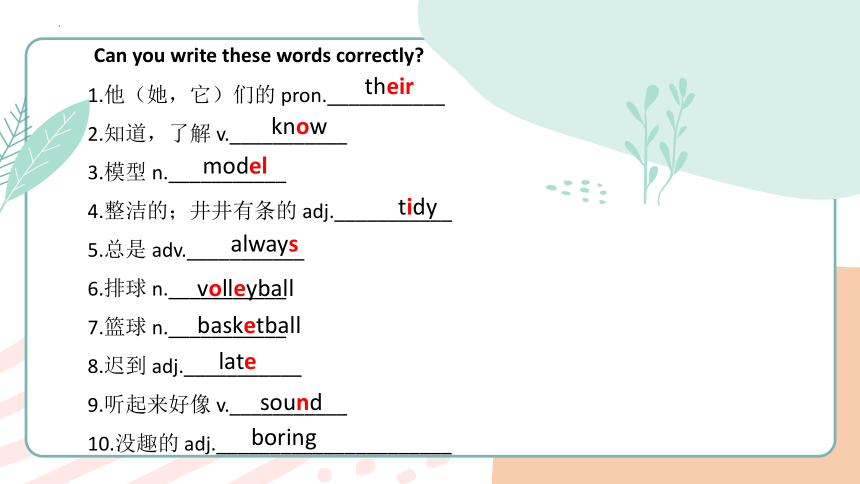
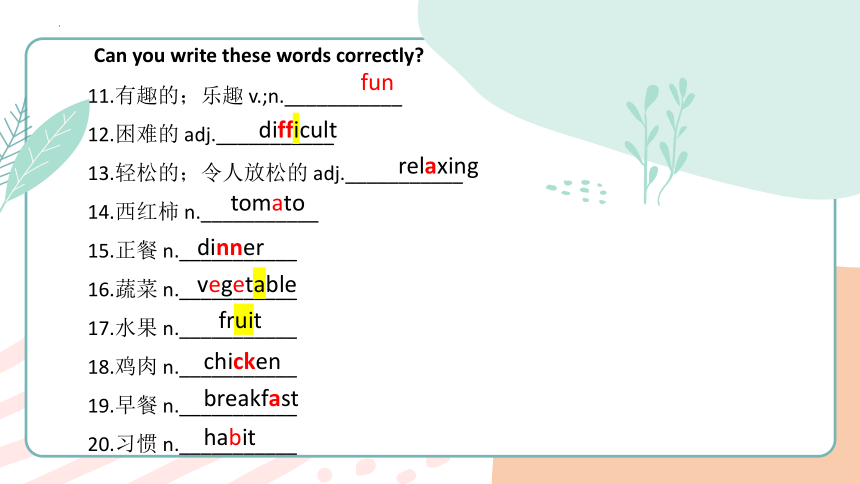
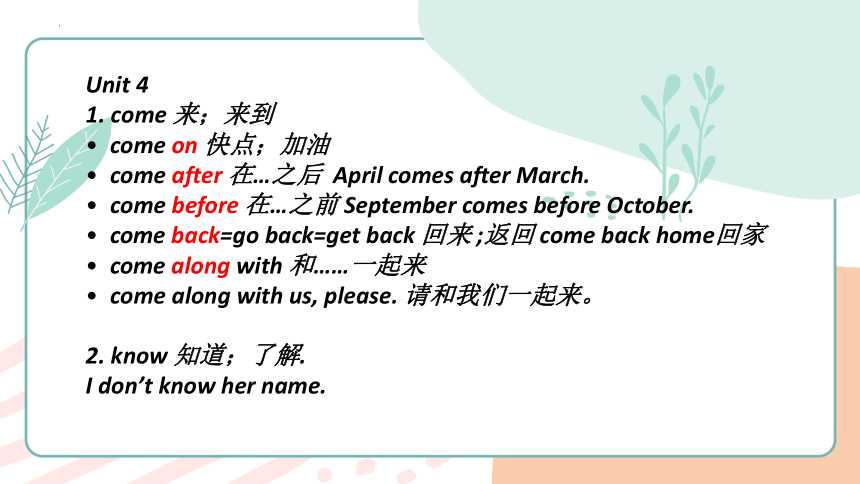
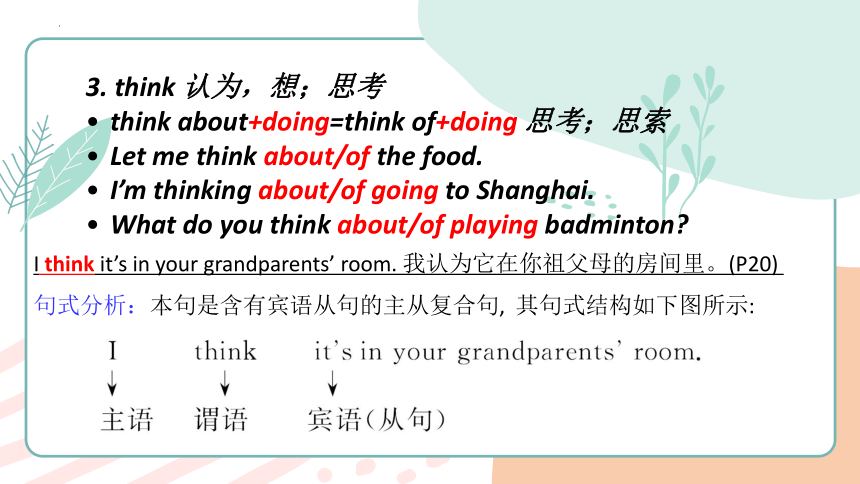
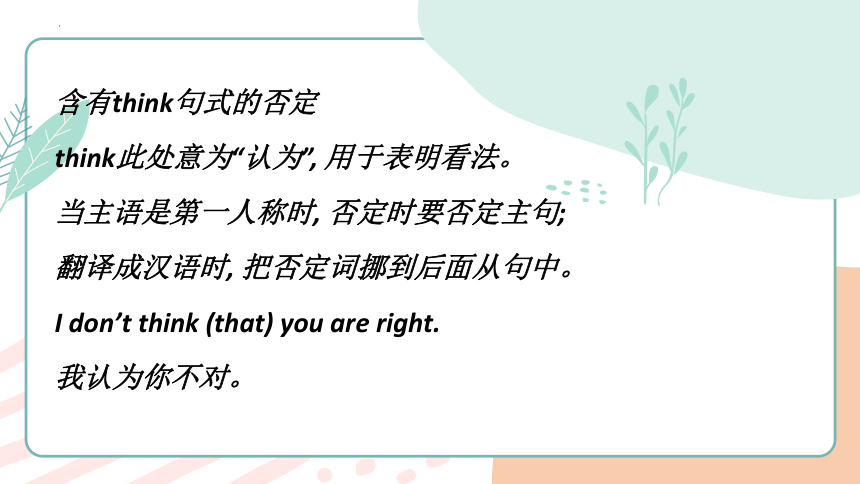
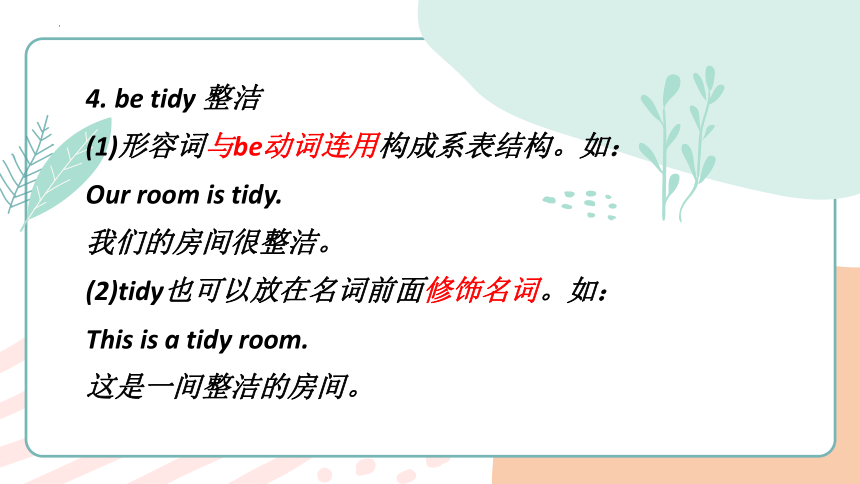
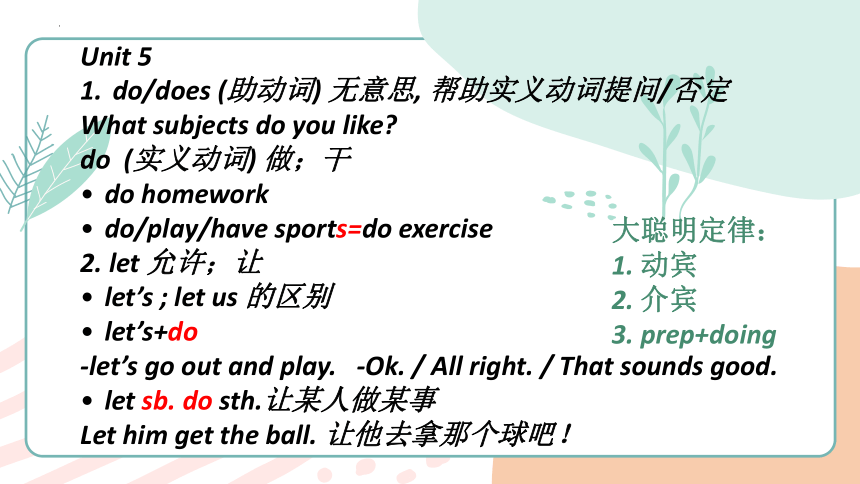
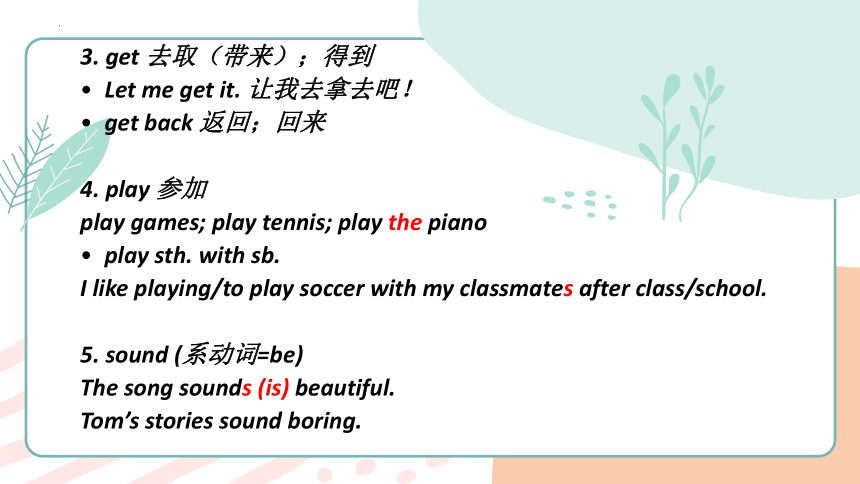
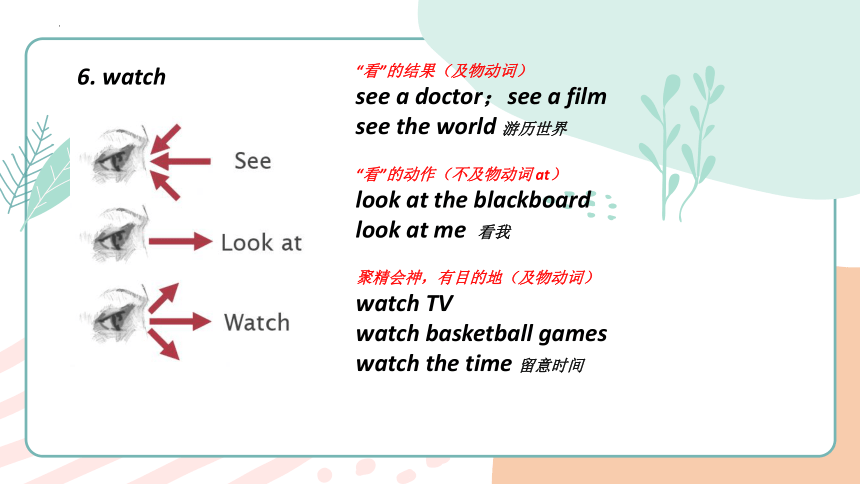
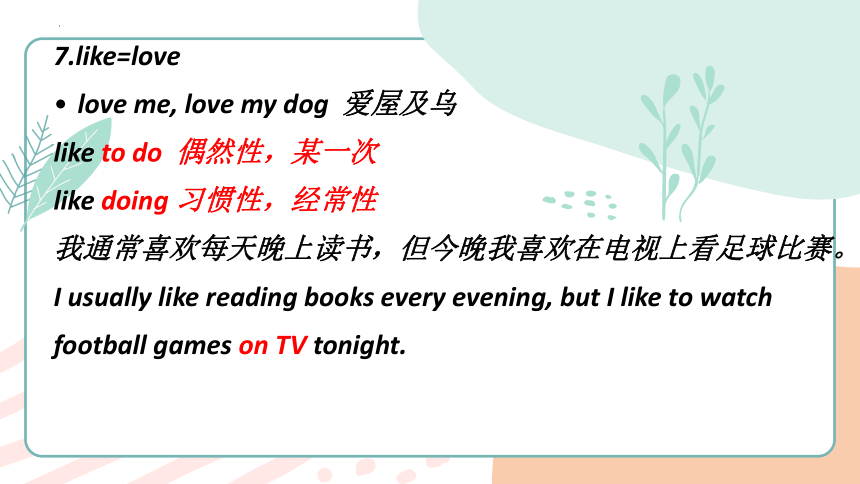
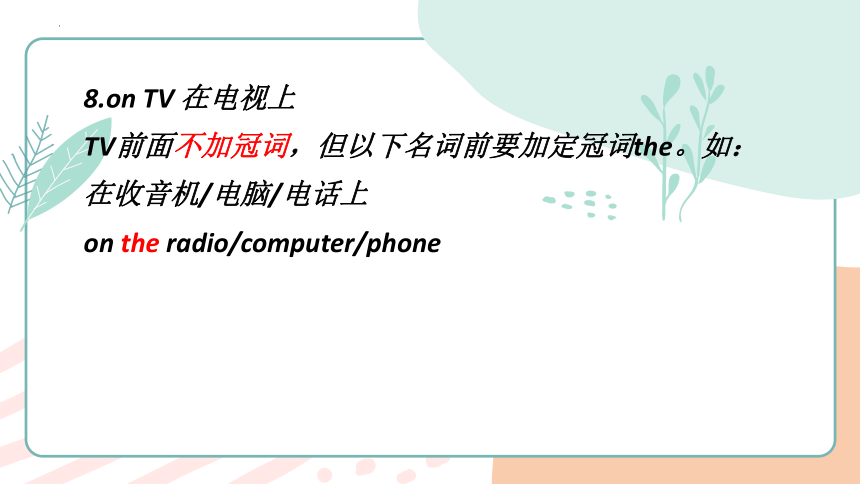
文档简介
(共30张PPT)
Unit4-6 Revision
Review
Can you write these words correctly
1.他(她,它)们的 pron.___________
2.知道,了解 v.___________
3.模型 n.___________
4.整洁的;井井有条的 adj.___________
5.总是 adv.___________
6.排球 n.___________
7.篮球 n.___________
8.迟到 adj.___________
9.听起来好像 v.___________
10.没趣的 adj.______________________
their
know
model
tidy
always
volleyball
basketball
late
sound
boring
Can you write these words correctly
11.有趣的;乐趣 v.;n.___________
12.困难的 adj.___________
13.轻松的;令人放松的 adj.___________
14.西红柿 n.___________
15.正餐 n.___________
16.蔬菜 n.___________
17.水果 n.___________
18.鸡肉 n.___________
19.早餐 n.___________
20.习惯 n.___________
fun
difficult
relaxing
tomato
dinner
vegetable
fruit
chicken
breakfast
habit
Unit 4
1. come 来;来到
come on 快点;加油
come after 在…之后 April comes after March.
come before 在…之前 September comes before October.
come back=go back=get back 回来 ;返回 come back home回家
come along with 和……一起来
come along with us, please. 请和我们一起来。
2. know 知道;了解.
I don’t know her name.
3. think 认为,想;思考
think about+doing=think of+doing 思考;思索
Let me think about/of the food.
I’m thinking about/of going to Shanghai.
What do you think about/of playing badminton
I think it’s in your grandparents’ room. 我认为它在你祖父母的房间里。(P20)
句式分析:本句是含有宾语从句的主从复合句, 其句式结构如下图所示:
含有think句式的否定
think此处意为“认为”, 用于表明看法。
当主语是第一人称时, 否定时要否定主句;
翻译成汉语时, 把否定词挪到后面从句中。
I don’t think (that) you are right.
我认为你不对。
4. be tidy 整洁
(1)形容词与be动词连用构成系表结构。如:
Our room is tidy.
我们的房间很整洁。
(2)tidy也可以放在名词前面修饰名词。如:
This is a tidy room.
这是一间整洁的房间。
Unit 5
do/does (助动词) 无意思, 帮助实义动词提问/否定
What subjects do you like
do (实义动词) 做;干
do homework
do/play/have sports=do exercise
2. let 允许;让
let’s ; let us 的区别
let’s+do
-let’s go out and play. -Ok. / All right. / That sounds good.
let sb. do sth.让某人做某事
Let him get the ball. 让他去拿那个球吧!
大聪明定律:
1. 动宾
2. 介宾
3. prep+doing
3. get 去取(带来);得到
Let me get it. 让我去拿去吧!
get back 返回;回来
4. play 参加
play games; play tennis; play the piano
play sth. with sb.
I like playing/to play soccer with my classmates after class/school.
5. sound (系动词=be)
The song sounds (is) beautiful.
Tom’s stories sound boring.
聚精会神,有目的地(及物动词)
watch TV
watch basketball games
watch the time 留意时间
“看”的动作(不及物动词 at)
look at the blackboard
look at me 看我
“看”的结果(及物动词)
see a doctor;see a film
see the world 游历世界
6. watch
7.like=love
love me, love my dog 爱屋及乌
like to do 偶然性,某一次
like doing 习惯性,经常性
我通常喜欢每天晚上读书,但今晚我喜欢在电视上看足球比赛。
I usually like reading books every evening, but I like to watch football games on TV tonight.
8.on TV 在电视上
TV前面不加冠词,但以下名词前要加定冠词the。如:
在收音机/电脑/电话上
on the radio/computer/phone
9.介词for的用法:
(1)意为“供……用;给……的”。如:
Is this apple for me
这个苹果是给我的吗?
(2)意为“作……用”,表示用途。如:
①Do you need bags for sports
你需要运动包吗?
②I need a cup for milk.
我需要一个装牛奶的杯子。
(3)意为“就……而言;对于……来说”。如:
①For lunch, I like hamburgers and salad.
午饭我喜欢吃汉堡和沙拉。
② We have nice purple sweaters for girls,.
对于女孩,我们有漂亮的紫色羊毛衫。
连词and, but, so与or的用法:
and意为“和;又;而且”,表顺承或递进关系
but意为“但是;可是”,表转折关系
so意为“因此;所以”,表因果关系
or意为“或;或者”,表选择关系。在“祈使句+or+简单句”的结构中,or还有“否则”之意
Unit 6
1.be (系动词)
be(实义动词) 变成
I don’t want to be fat.
2.want 需要;想要
(1)“want+名词”意为“想要某物”。如:
He wants a pen.
他想要一支钢笔。
(2)want to do sth.意为“想要做某事”。如:
Jack wants to go to the library.
杰克想要去图书馆。
(3)want sb.to do sth.意为“想要某人做某事”。如:
She wants me to help her with her math.
她想要我帮她补习数学。
【注意】want to be意为“想成为”。如:
—What do you want to be when you grow up?你长大想成为什么?
—I want to be a teacher.
我想成为一名老师。
food 的用法
(1)food用作不可数名词, 表示泛指的食物。
(2)food用作可数名词, 指具体的“特定种类的食品”。
①Tofu is a kind of traditional Chinese f____.
②I like different kinds of _____(食物).
ood
foods
fruit 的用法
( )①—What ______does your sister like
—She likes oranges.
A. color B. sport C. number D. fruit
②Xinjiang is home to many
popular _____ (水果), for example, grapes in Turpan.
D
fruits
常见的表示建议的句型:
*How/What about playing computer games
玩电脑游戏怎么样?
*Let’s play ping-pong, shall we
让我们打乒乓球, 好吗
*Shall we help her
我们帮帮她好吗
*Why not ask your teacher for help
*Why don’t you ask your teacher for help
为什么不向你的老师寻求帮助呢
*You’d better eat healthy food.
你最好吃健康的食物。
提出建议
How/ What about doing ...
Let’s do...
Shall we do...
Why not do...
Why don’t you do
You’d better do...
【辨析】 well, good和fine
well 作形容词, 意为“健康的”, 放在连系动词后作表语; 作副词, 意为“好; 令人满意地”, 修饰动词
good 形容词, 一般指人的品质好或物品的质量好
fine 通常指天气好或指身体健康
ask的用法
ask意为“要求; 请求”。其常见搭配为:
词汇 用法 例子
in 1.用于世纪、年、季节、月份。 2.泛指一天的上午、下午、晚上之前。 3.使用某种语言 4.穿某种颜色的衣服 5.位于...地方 in 2022, in summer,
in March, in the morning,in English, the boy in blue,in Beijing
词汇 用法 例子
on 用于具体的某一天或某一天的上午、下午、晚上之前。 on Sunday,
on Children’s Day,
on Monday afternoon,
on a cold morning
名词n.
可数n.
不可数n.
可数 不可数n.
a/an
动词(单数)
some
动词(复数)
单数时
复数时
many
few/a few
单数时
much
动词(单数)
复数时
复数量词
动词(复数)
并列复数
表统称
表统称
some
little/a little
one
不可数n.
bread rice milk
不可数n.自身没有复数形式,也不能用a/an/one等数词修饰。
用量词表示数量。用much/some/a lot of/lots of等修饰
1. There (be) some bread.
2. We have (很多)milk.
3. He drinks 3 (杯) of milk.
4. Five pieces of bread (be) mine.
5. Can I have some .(米饭)
Exercise
is
much
cups
are
rice
可数n.
vegetables carrots tomatoes
oranges bananas apples pears strawberies
hamburgers burgers eggs
其他 birthday star habit question week
fruit
food
1. We have (汉堡)for lunch.
2. I think (蔬菜) are healthy.
3. I get egg and two (tomato).
Exercise
hamburgers
vegetables
an
tomatoes
可数n.
orange
birthday
habit
question
“问题”——可数名词 “提问”——动词
固定搭配: ask a question answer the question
固定搭配:an eating habit饮食习惯 living habits 生活习惯
birthday party/dinner/cake/card 生日聚会晚餐/蛋糕/卡片
1.橙子 可数名词 an orange一个橙子
2. 橙色 形容词和不可数名词
3.橙汁,不可数名词, a glass of orange 一杯橙汁
不可数n.
可数
不可数时 可数时
food 表示食物的总称 Let’s think about the food. 当表示特定种类的食品
sea foods 海鲜
fruit 表示水果的总称 表示水果的种类
salad 泛指沙拉这种食品 特指沙拉作为一份食物
ice-cream 泛指冰激凌这种食品 I like ice-cream 表示冰激凌份数
an ice-cream
chicken 表示鸡肉总称 表示小鸡
breakfast/lunch/dinner 表示早午晚餐的总称 have dinner 指早中晚餐吃的东西时
have a good breakfast
Unit4-6 Revision
Review
Can you write these words correctly
1.他(她,它)们的 pron.___________
2.知道,了解 v.___________
3.模型 n.___________
4.整洁的;井井有条的 adj.___________
5.总是 adv.___________
6.排球 n.___________
7.篮球 n.___________
8.迟到 adj.___________
9.听起来好像 v.___________
10.没趣的 adj.______________________
their
know
model
tidy
always
volleyball
basketball
late
sound
boring
Can you write these words correctly
11.有趣的;乐趣 v.;n.___________
12.困难的 adj.___________
13.轻松的;令人放松的 adj.___________
14.西红柿 n.___________
15.正餐 n.___________
16.蔬菜 n.___________
17.水果 n.___________
18.鸡肉 n.___________
19.早餐 n.___________
20.习惯 n.___________
fun
difficult
relaxing
tomato
dinner
vegetable
fruit
chicken
breakfast
habit
Unit 4
1. come 来;来到
come on 快点;加油
come after 在…之后 April comes after March.
come before 在…之前 September comes before October.
come back=go back=get back 回来 ;返回 come back home回家
come along with 和……一起来
come along with us, please. 请和我们一起来。
2. know 知道;了解.
I don’t know her name.
3. think 认为,想;思考
think about+doing=think of+doing 思考;思索
Let me think about/of the food.
I’m thinking about/of going to Shanghai.
What do you think about/of playing badminton
I think it’s in your grandparents’ room. 我认为它在你祖父母的房间里。(P20)
句式分析:本句是含有宾语从句的主从复合句, 其句式结构如下图所示:
含有think句式的否定
think此处意为“认为”, 用于表明看法。
当主语是第一人称时, 否定时要否定主句;
翻译成汉语时, 把否定词挪到后面从句中。
I don’t think (that) you are right.
我认为你不对。
4. be tidy 整洁
(1)形容词与be动词连用构成系表结构。如:
Our room is tidy.
我们的房间很整洁。
(2)tidy也可以放在名词前面修饰名词。如:
This is a tidy room.
这是一间整洁的房间。
Unit 5
do/does (助动词) 无意思, 帮助实义动词提问/否定
What subjects do you like
do (实义动词) 做;干
do homework
do/play/have sports=do exercise
2. let 允许;让
let’s ; let us 的区别
let’s+do
-let’s go out and play. -Ok. / All right. / That sounds good.
let sb. do sth.让某人做某事
Let him get the ball. 让他去拿那个球吧!
大聪明定律:
1. 动宾
2. 介宾
3. prep+doing
3. get 去取(带来);得到
Let me get it. 让我去拿去吧!
get back 返回;回来
4. play 参加
play games; play tennis; play the piano
play sth. with sb.
I like playing/to play soccer with my classmates after class/school.
5. sound (系动词=be)
The song sounds (is) beautiful.
Tom’s stories sound boring.
聚精会神,有目的地(及物动词)
watch TV
watch basketball games
watch the time 留意时间
“看”的动作(不及物动词 at)
look at the blackboard
look at me 看我
“看”的结果(及物动词)
see a doctor;see a film
see the world 游历世界
6. watch
7.like=love
love me, love my dog 爱屋及乌
like to do 偶然性,某一次
like doing 习惯性,经常性
我通常喜欢每天晚上读书,但今晚我喜欢在电视上看足球比赛。
I usually like reading books every evening, but I like to watch football games on TV tonight.
8.on TV 在电视上
TV前面不加冠词,但以下名词前要加定冠词the。如:
在收音机/电脑/电话上
on the radio/computer/phone
9.介词for的用法:
(1)意为“供……用;给……的”。如:
Is this apple for me
这个苹果是给我的吗?
(2)意为“作……用”,表示用途。如:
①Do you need bags for sports
你需要运动包吗?
②I need a cup for milk.
我需要一个装牛奶的杯子。
(3)意为“就……而言;对于……来说”。如:
①For lunch, I like hamburgers and salad.
午饭我喜欢吃汉堡和沙拉。
② We have nice purple sweaters for girls,.
对于女孩,我们有漂亮的紫色羊毛衫。
连词and, but, so与or的用法:
and意为“和;又;而且”,表顺承或递进关系
but意为“但是;可是”,表转折关系
so意为“因此;所以”,表因果关系
or意为“或;或者”,表选择关系。在“祈使句+or+简单句”的结构中,or还有“否则”之意
Unit 6
1.be (系动词)
be(实义动词) 变成
I don’t want to be fat.
2.want 需要;想要
(1)“want+名词”意为“想要某物”。如:
He wants a pen.
他想要一支钢笔。
(2)want to do sth.意为“想要做某事”。如:
Jack wants to go to the library.
杰克想要去图书馆。
(3)want sb.to do sth.意为“想要某人做某事”。如:
She wants me to help her with her math.
她想要我帮她补习数学。
【注意】want to be意为“想成为”。如:
—What do you want to be when you grow up?你长大想成为什么?
—I want to be a teacher.
我想成为一名老师。
food 的用法
(1)food用作不可数名词, 表示泛指的食物。
(2)food用作可数名词, 指具体的“特定种类的食品”。
①Tofu is a kind of traditional Chinese f____.
②I like different kinds of _____(食物).
ood
foods
fruit 的用法
( )①—What ______does your sister like
—She likes oranges.
A. color B. sport C. number D. fruit
②Xinjiang is home to many
popular _____ (水果), for example, grapes in Turpan.
D
fruits
常见的表示建议的句型:
*How/What about playing computer games
玩电脑游戏怎么样?
*Let’s play ping-pong, shall we
让我们打乒乓球, 好吗
*Shall we help her
我们帮帮她好吗
*Why not ask your teacher for help
*Why don’t you ask your teacher for help
为什么不向你的老师寻求帮助呢
*You’d better eat healthy food.
你最好吃健康的食物。
提出建议
How/ What about doing ...
Let’s do...
Shall we do...
Why not do...
Why don’t you do
You’d better do...
【辨析】 well, good和fine
well 作形容词, 意为“健康的”, 放在连系动词后作表语; 作副词, 意为“好; 令人满意地”, 修饰动词
good 形容词, 一般指人的品质好或物品的质量好
fine 通常指天气好或指身体健康
ask的用法
ask意为“要求; 请求”。其常见搭配为:
词汇 用法 例子
in 1.用于世纪、年、季节、月份。 2.泛指一天的上午、下午、晚上之前。 3.使用某种语言 4.穿某种颜色的衣服 5.位于...地方 in 2022, in summer,
in March, in the morning,in English, the boy in blue,in Beijing
词汇 用法 例子
on 用于具体的某一天或某一天的上午、下午、晚上之前。 on Sunday,
on Children’s Day,
on Monday afternoon,
on a cold morning
名词n.
可数n.
不可数n.
可数 不可数n.
a/an
动词(单数)
some
动词(复数)
单数时
复数时
many
few/a few
单数时
much
动词(单数)
复数时
复数量词
动词(复数)
并列复数
表统称
表统称
some
little/a little
one
不可数n.
bread rice milk
不可数n.自身没有复数形式,也不能用a/an/one等数词修饰。
用量词表示数量。用much/some/a lot of/lots of等修饰
1. There (be) some bread.
2. We have (很多)milk.
3. He drinks 3 (杯) of milk.
4. Five pieces of bread (be) mine.
5. Can I have some .(米饭)
Exercise
is
much
cups
are
rice
可数n.
vegetables carrots tomatoes
oranges bananas apples pears strawberies
hamburgers burgers eggs
其他 birthday star habit question week
fruit
food
1. We have (汉堡)for lunch.
2. I think (蔬菜) are healthy.
3. I get egg and two (tomato).
Exercise
hamburgers
vegetables
an
tomatoes
可数n.
orange
birthday
habit
question
“问题”——可数名词 “提问”——动词
固定搭配: ask a question answer the question
固定搭配:an eating habit饮食习惯 living habits 生活习惯
birthday party/dinner/cake/card 生日聚会晚餐/蛋糕/卡片
1.橙子 可数名词 an orange一个橙子
2. 橙色 形容词和不可数名词
3.橙汁,不可数名词, a glass of orange 一杯橙汁
不可数n.
可数
不可数时 可数时
food 表示食物的总称 Let’s think about the food. 当表示特定种类的食品
sea foods 海鲜
fruit 表示水果的总称 表示水果的种类
salad 泛指沙拉这种食品 特指沙拉作为一份食物
ice-cream 泛指冰激凌这种食品 I like ice-cream 表示冰激凌份数
an ice-cream
chicken 表示鸡肉总称 表示小鸡
breakfast/lunch/dinner 表示早午晚餐的总称 have dinner 指早中晚餐吃的东西时
have a good breakfast
同课章节目录
- starters 预备篇(2012秋审查)
- Unit 1 Good morning !
- Unit 2 What’s this in English?
- Unit 3 What color is it ?
- Unit 1 My name's Gina.
- Section A
- Section B
- Unit 2 This is my sister.
- Section A
- Section B
- Unit 3 Is this your pencil?
- Section A
- Section B
- Unit 4 Where's my schoolbag?
- Section A
- Section B
- Unit 5 Do you have a soccer ball?
- Section A
- Section B
- Unit 6 Do you like bananas?
- Section A
- Section B
- Unit 7 How much are these socks?
- Section A
- Section B
- Unit 8 When is your birthday?
- Section A
- Section B
- Unit 9 My favorite subject is science.
- Section A
- Section B
